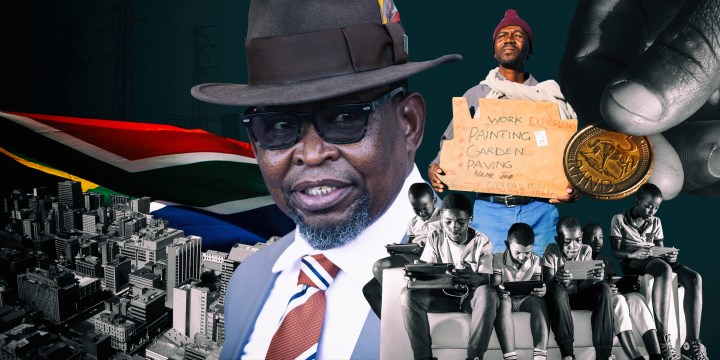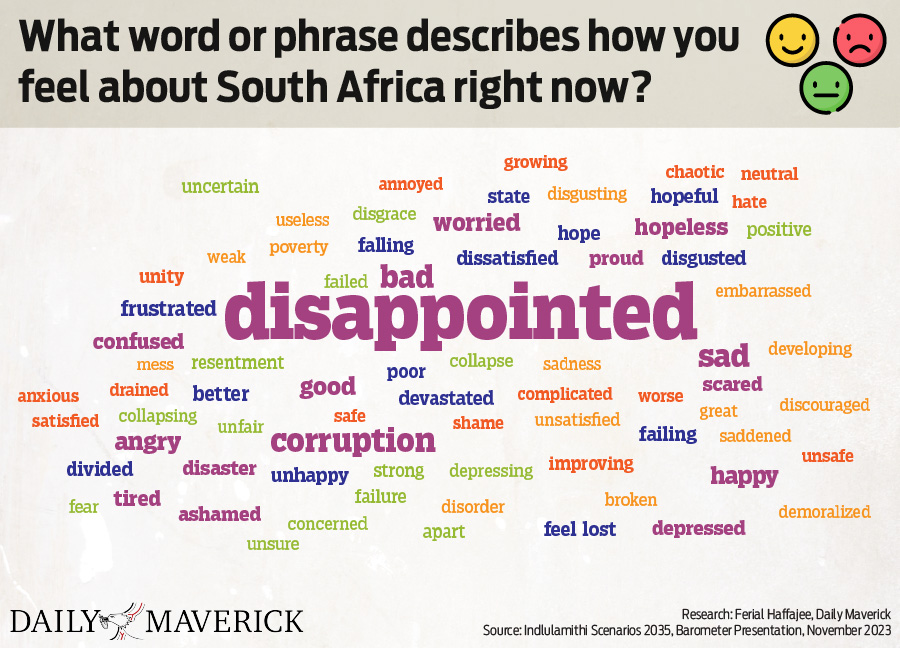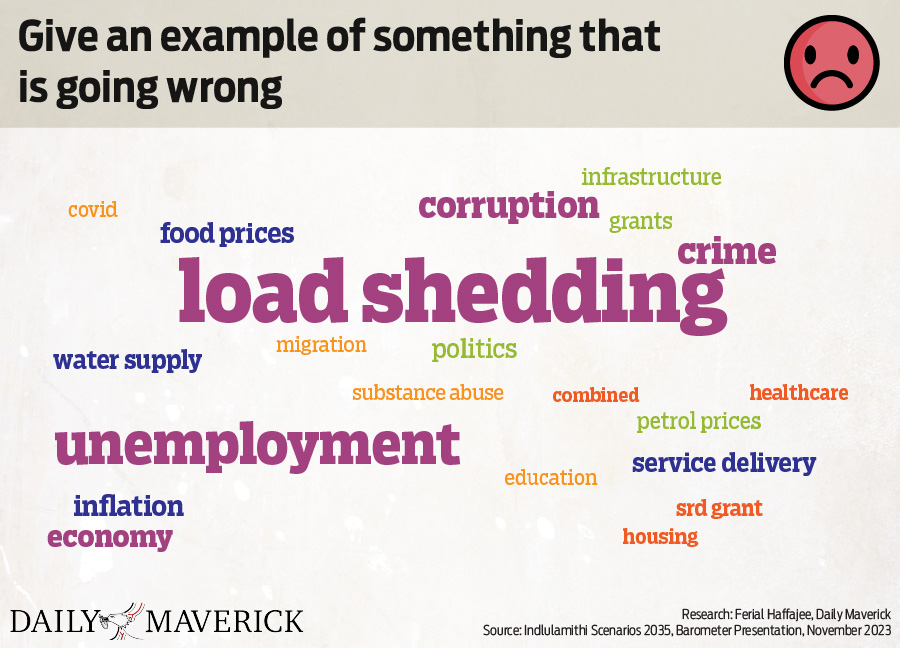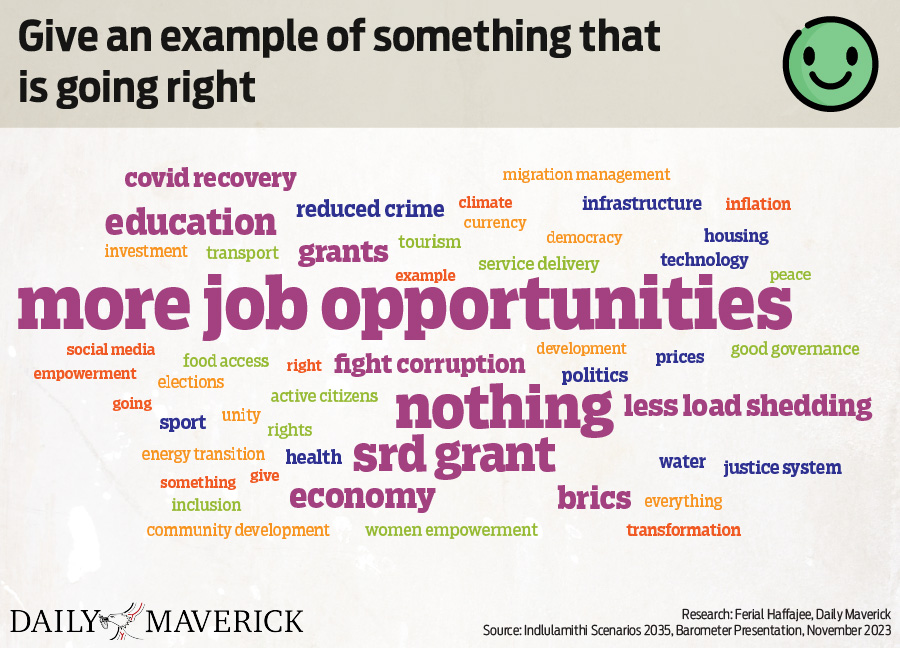ANALYSIS
The mood in SA is one of disappointment — but a rebound is possible, future scenarios reveal

Futurists have released their barometer of South Africa’s current status and a new set of scenarios on where the country could be by 2035 when it will mark 40 years of democracy.
“In 2016, some individuals decided they were sick and tired of being sick and tired. They decided to start a platform for strategic conversation about the future,” says Professor Somadoda Fikeni, the chairperson of Indlulamithi Scenarios.
The futurists have released their barometer of South Africa’s current status and a new set of scenarios on where the country could be by 2035 when it will mark 40 years of democracy.
“South Africa has used scenarios as a way of thinking our way out of the belly of crises,” says Fikeni, recalling how Clem Sunter’s scenarios helped negotiators of the political transition to decide on their positions and set a national path.
Fikeni says 2024 will be a politically volatile year with a national election. Scenarios can help the country pull itself from the brink of disaster like it did in the 1990s and again when commentators predicted a disastrous World Cup in 2010. (In fact, it was delightful and a success.)
The Indlulamithi team tracks performance on its 2030 scenarios. Here’s the bad news.
“Our insight in 2023 was that the scenarios were no longer telling us what is happening in the country — we were beyond the worst-case scenario,” they said.
This “Gwara-Gwara” scenario describes a demoralised, decaying and disorderly society, deeply divided, often involved in protest action, with wealthy areas surrounded by seas of poverty.
Its favourable scenario is called “Nayi le Walk”, describing (a nation in step with itself). Its median scenario is “iSbhujwa”, epitomising a loose-limbed, jumpy (nervous) and enclave society of some bourgeois, but more lumpenproletariat, the Marxist term for an underclass. The three titles are the names of edgy urban dance forms.
Higher inequality, staggering unemployment, plummeting business confidence and Covid-19 led to everyday life in South Africa that is almost dysfunctional.
Here’s the counterfactual aspect of the Indlulamithi barometer: “At the same time, at an institutional level and [in how] people feel about themselves, South Africans have much more hope.”
Young people (under 30) are more hopeful than older South Africans. People who live in smaller, rural provinces (Free State, Mpumalanga) have a brighter perspective on the future. This finding is counter to the narrative, but Indlulamithi measures across 54 data sets, making its scenarios deep and accurate.
Besides mining data, the futurists also do representative sample surveys of South Africans, asking them to describe their mood, define their biggest problem and share what gives them hope.
The word clouds from the findings show that the word defining the South African mood is “disappointed”.
“You will see that [words like] ‘disappointed’, ‘sad’, ‘worried’ are much bigger [more prominent] than words like ‘angry’. [People are saying], we had a different vision and expectation, but it tells you that the vision and expectation are still there somewhere. It’s an interesting place to be in an election year because it means people are asking, ‘Do I vote? And if so, who do I vote for?’” says Indlulamithi’s Dr Tara Polzer Ngwato.
When asked what was going wrong in SA, respondents said “load shedding”.
“If load shedding can be improved in the next six to 12 months, it will address something that hurts people emotionally and physically,” she found.
When researchers asked respondents what was going right, they said there were more job opportunities — despite the quarterly employment statistics showing declining employment.
The Presidential Employment Stimulus has given work opportunities to almost 1 million people since its launch in 2020. It’s vast and undertracked but showing up in the Indlulamithi Scenarios. Respondents also chalked up the R350 monthly Social Relief of Distress (SRD) grant as something going right.
“It’s a challenge because the two stand to be discontinued,” Polzer Ngwato said. Public employment and the SRD may face the scythe as Finance Minister Enoch Godongwana looks to make savings ahead of next year’s budget.
“Most respondents said some things are going right, and some are going wrong. In 2023, there is a slight decrease in the Gwara-Gwara category, which suggests there is some hope,” Polzer Ngwato said.
The next set of scenarios
Indlulamithi released its next set of scenarios, which look at South Africa in 2035, only 12 years away. This time, the team has changed the scenarios’ names to those of birds because they are symbols of universal appeal, Fikeni said.
“The value of scenarios in highly uncertain times is not about predicting the future but having conversations to enable plans today,” Polzer Ngwato said.
Below is an edited version of the Indlulamithi Scenarios 2035.
Life in 2035
The world is far hotter, and sea levels are rising faster than expected. Many nations at least try to reduce their carbon emissions, but climate change has made food security in poorer countries more precarious than ever. Pandemics have become more routine.
The global economy has shifted sharply eastwards: China is the world’s largest economy, and India is ranked third.
AI-driven technology has democratised access to education and spurred global productivity; it has also disrupted entire industries and eliminated millions of jobs globally.
What is South Africa like in 2035? How prosperous are its people? How cohesive is its society? How far has it come in the 40 years since the dawn of democracy? Below are three scenarios.
1. Hadeda Nation
A squawking and shrill nation.
Politics
A centrist social democratic coalition governs South Africa. But party leaders exert control; everything is negotiated. Decision-making and policy implementation are slow. In some areas, local and provincial coalition governments restore semblances of good governance, but alliances are unprincipled and self-interested elsewhere.
Economics
Rooftop solar and hydrogen energy have yet to scale up quickly enough to prevent further economic downturns. AI and automation have transformed the world of work but have eliminated more jobs than they have created. The national unemployment rate is 37%, and youth unemployment hovers around 55%. Income and wealth inequality measures have hardly shifted and remain among the highest in the world.
Crime
Crime has evolved from disorganised and contingent to systemic and structured, as South Africa becomes a magnet for global criminality. South Africans are sicker.
The national mood
Walls are high, and essential goods are commonly stockpiled. Despite the well-run 2034 election, grumpy South Africans share few common goals beyond occasional sporting successes and survival. People are on edge everywhere: the blame game is the national sport.
2. Vulture Culture
Scavengers hold the upper hand, ripping the skin from the body politics.
Politics
The liberal right-of-centre coalition that took power in 2024 alienated citizens with its austerity and repressive crime-fighting tactics, giving way in 2029 to a fragile populist coalition. The new coalition government embraced an authoritarian populism at odds with the Constitution, lashing out at critics and journalists, denigrating migrants and seemingly working with criminal syndicates.
Social media-driven voter suppression tactics confused and demoralised potential oppositions, as did widescale arrests for “subversion”. Despite its poor governing record, the coalition was re-elected in 2034, gaining from the lowest-ever voter turnout in a national election.
Economics
Official unemployment rates exceed 43%; youth unemployment soars above 60%. Fiscal catastrophe looms as South Africa borrows from anyone willing to extend credit. One-third of South Africans go to bed hungry more than one day a week.
The national mood
Life is hard for ordinary South Africans. Expansive gas and oil discoveries and revenue ignite some hope, but the vultures are rapacious in diverting these windfalls into their own pockets.
3. Weaver Work
A country marked by industrious collaboration like that of the Kalahari social weaver.
Politics
In the mid-2020s, “gatvol” South Africans, civil society and community groups launched a protest movement against inequality, poverty, and lack of services. People forged alliances across social divides of race and class. Artists, too, got involved, giving new life to the creative industries. All this put massive pressure on the government and businesses to respond to people’s demands. There is a fresh sense of active citizenship and constitutionalism.
For the 2029 elections, parties were forced to consider serious grassroots demands. A shaky coalition took power based on “listening to the people”. By building cooperative structures between government, civil society, and the private sector, the “Concord Compromise” government (of the three largest parties) relentlessly focused on service delivery, dealing with poverty and inequality, driving down crime, improving education and shoring up South Africa’s core infrastructure.
Economics
Restructuring state-owned enterprises helped attract foreign direct investment. South Africa’s green energy transition began to show results in the mid-2020s and is faster and fairer than expected, promoting a broader regional prosperity.
Shrewd interventions in agriculture and tourism have slowed previous rapid urbanisation rates. The construction boom extends beyond infrastructure and commercial property to a more comprehensive social, affordable housing provision. As the population nears 70 million, immigration increases; many South Africans “reverse migrate”. South Africa has become a wise investment. Substantial financing for the just transition and strong economic growth from 2030 to 2035 reduces unemployment to 18% in 2035. Youth unemployment drops to 33%, and measures of income inequality improve
The national mood
South Africans are working together more closely and emerging as a proud, hard-working, socially conscious nation. DM




















Sheer, unmitigated, demonstrable baloney. Anyone who still harbours a belief that SA isn’t already doomed, is plainly delusional.
While the average SAn is hard-working and inventive and diligent, the same average SAn isn’t savvy enough to reject the ruinous misrule of the entrenched ANC Mafia. 2024, as a new order, is a chimera, a Panglossian fantasy. Only the politically connected will thrive. The rest of the country will circle the drain as it slowly drowns in the $#!+ the ruling class has bequeathed us.
Surprised that the three words and phrases, ANC, BEE and cadre deployment are not featured more prominently, because they, together with rampant crime and corruption, aided and abetted by a politically-connected and grossly corrupt police force, whose sole raison d’être is the protection of the senior ANC cadre-elite, are at the root of all our problems.
We are already in the “Vulture culture”, with the ANC/EFF working together behind the scenes most probably.
Regarding the first graphic, there are some near-synonyms that probably should have been merged to give a clearer picture:
depressed & depressing
hope & hopeful
drained & demoralised
growing & developing
better & improving
unsure & uncertain
I’m sure even more could be found. It would be interesting to see an updated version.
Based on the performance of past scenarios where we have steadfastly continued to choose the low road & I would like to predict the following reality. Every year, in desperation, we will conjure up more scenarios in the hope of finding something to hope for. The ruling politicians and their criminal associates (or is it the other way around?) will be come more desperate and brazen. Those with the means (money, education and opportunity) will continue to leave in droves taking with them meaningful jobs and the tax base. Those poor souls left behind will be without hope with the vultures circling. The world will move on and South Africa will be forgotten. The End.
In an interview with Tessa Dooms of the Rivonia Circle, talking about the low voter registration numbers, she recounts the opinion of a young man from KZN. His opinion was that voting & democracy only ‘works & assists’ those who are being voted for & does nothing for those casting their ballots.
This points a finger directly at our Politicians who attach more importance to winning an election than what people are actually voting for which presumably is a better life & a brighter future.
What I believe the above study highlights is that our current political trajectory will do nothing for us & that the best answer is for civil society to stand together & to compel our Leaders & Business to ‘work for us’
The message is quite clear & that is the current political scenario is divisive & self serving & will not work. Democracy is meant to give ‘power to the people’ but it is simply not doing that
Long term scenario planning is a farce for SA – only short term ousting of the current governance regime, together with swift harsh consequence resolution for all those political and corrupt individual currently responsible for our current position, will allow for any positive future planning.
Please give me one country (let’s not limit it to Africa stereotype…) where that happened?
Until such time as politics is not seen as the gateway to limitless enrichment, then this country is going one way – and I don’t see that changing anytime soon.
“I think all right-thinking people in this country are sick and tired of being told that ordinary, decent people are fed up in this country with being sick and tired … I’m certainly not!
“And I’m sick and tired of being told that I am.”
Scenario planning is a fine art, but judging from the comments, none of your readers were asked our views – which seem to be collectively negative. It is more than difficult to envision a ‘high road’ option in our current situation, and even to access any innate optimism. Love the concept of the ‘Weaver Work’ scenario, but it would require that we all focus our energy on the positive rather than the negative – no small task – but one to which we CAN (not ANC) contribute individually. Simply treating everyone with whom we come into contact with the respect that we would like to receive would significantly shift the energy around us. Shooo-wah I know, but it works.
What is missing from the 2035 scenarios are the domino impacts of both climate change and Covid. Both are ongoing, accelerating, global disasters which most futurists dismiss as marginal because it is politically unwise to talk about them.
With each reinfection, Covid incrementally damages cognitive capacities and immune systems, taking swathes of people out of the workforce, creating a massive public health crisis, and leaving the youth especially inept and ill. Most of the population has already had Covid several times and will be re-infected two or three times a year. By 2035, unless a cure is found, it will have crippled the economy.
By 2035, climate change, in addition to destroying infrastructure and displacing South Africans through flooding and unlivable temperatures, will have caused ongoing, worsening, global crop failures and famines. This does not simply mean widespread hunger and rampant inflation for South Africans – more than a billion people worldwide will be driven to migrate in search of food and aid. A hundred million or more may move across our borders, terminally ending civil society as we know it, and pushing into power a militant rightwing nationalist government – if governance is even possible.
I understand that individuals and governments don’t want to acknowledge this, because then they’d have to do something about it. Denial is a coping mechanism. But scenario planners and futurists have a responsibility to highlight the seeming inevitability of these trends. This is not a fringe “doomer” scenario, it’s objective probability – and governments, companies, and families should be planning for it.
While of passing interest, the survey would have been more revealing if it had classified respondents, say between:
Taxpayers & grant recipients
Employed & unemployed
Skilled/educated & unskilled/less qualified
Investors & net borrowers
The former presumably have the power to change their personal lives, by emigration and/or by investment. Their decisions will affect us economically while the latter group seem to have more influence politically.
An even more likely scenario is what Clem Sunter termed “Fortress Constantia”. Local communities that can build higher walls and deeper moats and become increasingly self serving. Service delivery is undertaken by one-sided public private partnerships. ‘Civil servants’ [oxymoron acknowledged] get paid to stay out of the way. Rising disparity on the outside re-organises for a repeat of July 2021 unrest on steroids!
I’m surprised not one of these scenarios envisaged the current government losing an election but then rigging the obvious result, then clinging to power through manipulation, repression and subterfuge.
A popular local writer and columnist presented the unpalatable fact that a liberation movement has never quietly accepted defeat at the polls on our continent. Not one.
It’s hard not to agree with Con Tester and certainly the massive emigration of young people of all races gives testimony to this.
But many of us are economic prisoners here as we are too old to emigrate and do not have enough money to do so, so we have to hope for the best scenario and not the vulture scenario and in our small ways work for that.
That’s most probably the best future joke of SA I have ever heard of.
Let’s all be honest & face the facts!
While the ANC is in power they will keep on destroying this country & once the ANC & EFF start a coalition together it will no doubt, 100% guaranteed to be the end of SA.
SA will become the next Zimbabwe under rule of the ANC & EFF THUGS.
100%
What is “The Indlulamithi team” the only “Dlulamithi” I know, was a name given to a massive Elephant meaning “Taller than the trees” this was mentioned inthe book The Ivory Trail by T V Bulpin.
Pplease enlighten me
“Indlulamithi” is the isiZulu word for giraffe. Elephant = Ndlovu
Possible, but certainly not probable…
I am hoping that someone here can explain how governments create jobs, beyond creating positions paid for from the public purse (i.e. the civil service). I get it that increased investment from outside leads to more jobs and that government economic policies (and a publicly maintained infrastructure) influence how much investment/disinvestment comes about. But at what point can a government claim that it actually ‘created’ the job? Numbers are thrown at us, but I am at a loss to know how they are arrived at. Please, can someone with a handle on this share some insight? I’m also confused as to the difference between a job and a job opportunity.
Possible, maybe.
Probable, nope.
How do you see comments without posting your own?
Let’s not mince with words!
The communist Marxist ideology of the ‘Rainbow Nation’ has failed dismally.
South Africa is now a failed state and mass starvation is looming!
More of that ideology can only worsen the situation.
The only hope for SA is the Free Market where the size of government is reduced by at least 50% to be able to release cash for the private sector to flourish!
The Bell Pottinger propaganda, (paid for by the Guptas) must be replaced with terminolovy that characterize successfull nations such as Japan. PRODUCTIVITY, COMPETITION and EQUAL OPPORTUNITIES!
That’s all!
Compare SA citizens to those of Lesotho, Swaziland, Botswana, Mozambique and Zimbabwe … to make valid comparisons. South Africans are much wealthier than the neighbours!
It’s not valid to compare the poorest to the richest and then define it as ‘inequality’.
Or to make it even more simple!
South Africa must choose to go North or South!
Moving North will take SA to the Zimbabwe disaster!
Moving South will take SA to the successfull and flourishing Cape!
There’s no middle road!
mhs : Weaver Work: wonderful, but unfortunately still cloud cooko land. if only.
Very obviously, South Africans have a much more resilient view of South Africa than the jaundiced commentary in the comments section of DM.
SA will become like the rest of Africa. It’s just a bit delayed, but wait for the reserves to be eaten up. Africa is…well, Africa. There is a reason why nothing works.
Great article but if these scenario’s are not honest enough to conjure scenarios that include the absence of land reform and without progress in that arena, South Africa remains too much on the Zimbabwe-like road. So is this scenario study perhaps too biased to represent the interests of the poor? Who actually speaks up for the poor? Churches used to do that but seem silient these days? Not even Unions are getting there either! Civil society – a little perhaps but are they heard? And Government – especially in the ruling party – IS failing pitifully in that arena. That only leaves new political parties but are they actually reaching and finding traction ground level? The trouble is that the EFF does – but being popularist – is like “a rudderless ship” – that IS incredibly dangerous! That can destroy nearly anything in its path, like the Zanu PF chose to do in endorsing the leading activity of its own land-grabbing mavericks – their own Veterans from their bush war. So where are the scenario’s for RSA touching on these aspects?!